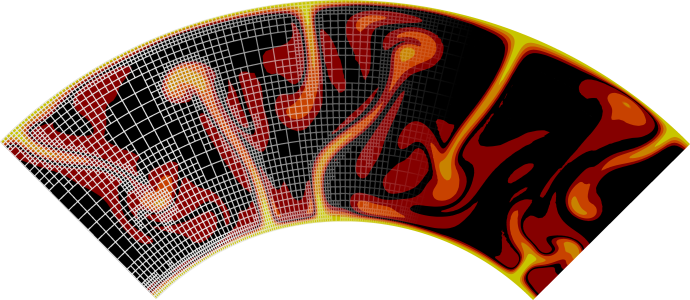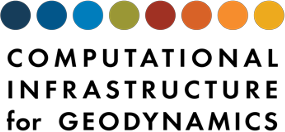Contributing to ASPECT#
ASPECT is a community project that lives by the participation of its members — i.e., including you! It is our goal to build an inclusive and participatory community so we are happy that you are interested in participating!
Getting started with git and GitHub#
If you are new to using git or the GitHub platform you may find it helpful to review video lecture 32.8, which should be enough to help you get started with using GitHub or possibly contributing to ASPECT itself. Alternatively, GitHub provides a helpful guide on the process of contributing to an open-source project here.
Asking and answering questions about ASPECT#
For questions about ASPECT on all levels, please use the ASPECT forum. Archived discussions from the inactive aspect-devel mailing list can be downloaded at aspect-devel archives.
Bug reports#
It is a great help to the community if you report any bugs that you may find. We keep track of all open issues related to ASPECT here.
Please follow these simple instructions before opening a new bug report:
Do a search in the list of open and closed issues for a duplicate of your problem.
Do a search in the ASPECT forum for a duplicate of your problem.
If you did not find an answer, open a new issue and explain your problem in as much detail as possible.
Attach as much as possible of the following information to your issue:
a minimal parameter file that reproduces the issue,
the
log.txtfile that was created during the model run,the error message you saw on your screen,
any information that helps us understand why you think this is a bug, and how to reproduce it.
Making ASPECT better#
ASPECT is a community project, and we are encouraging all kinds of contributions. Obvious candidates are implementations of new plugins as discussed in the manual, since they are typically self-contained and do not require much knowledge of the details of the remaining code. Other much appreciated contributions are new examples (cookbooks, tests, or benchmarks), extended documentation (every paragraph helps), and in particular fixing typos or updating outdated documentation. Obviously, we also encourage contributions to the core functionality in any form! If you consider making a larger contribution to the core functionality, please open a new issue first, to discuss your idea with one of the maintainers. This allows us to give you early feedback and prevents you from spending much time on a project that might already be planned, or that conflicts with other plans.
Opening pull requests#
To make a change to ASPECT you should:
Create a fork (through GitHub) of the code base.
Create a separate branch (sometimes called a feature branch) on which you do your modifications.
You can propose that your branch be merged into the ASPECT code by opening a pull request. This will give others a chance to review your code.
We follow the philosophy that no pull request (independent of the author) is merged without a review from one other member of the community, and approval of one of the maintainers. This applies to maintainers as well as to first-time contributors. We know that a review can be a daunting process, but pledge to keep all comments friendly and supportive, as you can see in the list of open pull requests! We are as interested in making ASPECT better as you are!
While this seems very formal, keeping all of the code review in one place makes it easier to coordinate changes to the code (and there are usually several people making changes to the code at once). This process is described at length in the deal.II video lecture 32.8. Please do not hesitate to ask questions about the workflow on the forum if you are not sure what to do.
Coding conventions#
Since ASPECT is a fairly large project with lots of contributors we use a set of coding conventions equal to those used by deal.II upon which ASPECT is based, so as to keep the style of the source code consistent. This convention essentially consists of using astyle v.2.04 with a style file for indentation, CamelCase for classes and namespaces, and lower_case_names_with_underscores for everything else. If you are new to the project then we will work with you to ensure your contributions are formatted with this style, so please do not think of it as a road block if you would like to contribute some code.
Installing astyle#
To correctly indent the code in ASPECT you can use make indent or ninja indent
depending on the build system you are using. The indenting script needs version 2.04 astyle.
If you installed deal.II through candi, the correct astyle may already on your system and in your path.
If the indenting script complains that it could not find (the correct version of) astyle,
you can find it here.
An easy way to install it is through using the following command in Linux (do not do this in the aspect directory):
mkdir astyle && cd astyle && wget 'https://sourceforge.net/projects/astyle/files/astyle/astyle 2.04/astyle_2.04_linux.tar.gz' && tar -zxvf astyle_2.04_linux.tar.gz && cd astyle/build/gcc && make && sudo make install.
This will create a new directory called astyle, download, unpack, compile and install it.
When you add the bin directory to to your path, the indent command should find astyle.
Changelog entries#
If your new pull request creates a change that is noticeable to ASPECT users, please add an entry to our changelog. To add such an entry, make a copy of one of the files in the doc/modules/changes/ folder and modify it to explain your change. The name of the file consists of the date of the change (approximately) and the name of the author. Start the file with a tag (added/changed/fixed/removed) that explains the nature of your change and include your name and date in the file in exactly the format of the other files, this ensures you will get credit for your work.
Acknowledgment of contributions#
The ASPECT community is grateful for every contribution! But, beyond this gratitude, there are also several formal ways in which your contribution will be acknowledged by the ASPECT community:
Every commit that is merged into the ASPECT repository makes you part of the growing group of ASPECT contributors.
Our biweekly forum newsletter mentions all raised issues and proposed and merged pull requests, including an acknowledgment of the author of the issue/pull request.
For every release the most significant entries of our changelog are selected to generate our release announcements. Additionally, all entries remain available for all previous releases of ASPECT inside the repository and on our website (under “Development”), which documents the functionality that you contributed to ASPECT.
If you contributed a significant part of the manual (such as a new cookbook, benchmark, or subsection), you will be listed as one of the contributing authors of the manual.
The Principal Developers of ASPECT come together on a regular basis and discuss whether others should be invited to join the group of Principal Developers. Criteria for this decision include:
A profound understanding of ASPECT’s structure and vision;
A proven willingness to further the project’s goals and help other users;
Significant contributions to ASPECT (not necessarily only source code, also forum advice, documentation, benchmarks, tutorials);
Regular and active contributions to ASPECT for more than one year, not restricted to user meetings.
The group of current Principal Developers is listed in the AUTHORS.md file in the main repository.
License#
ASPECT is published under the GPL v2 or newer; while you will retain copyright on your contributions, all changes to the code must be provided under this common license.

